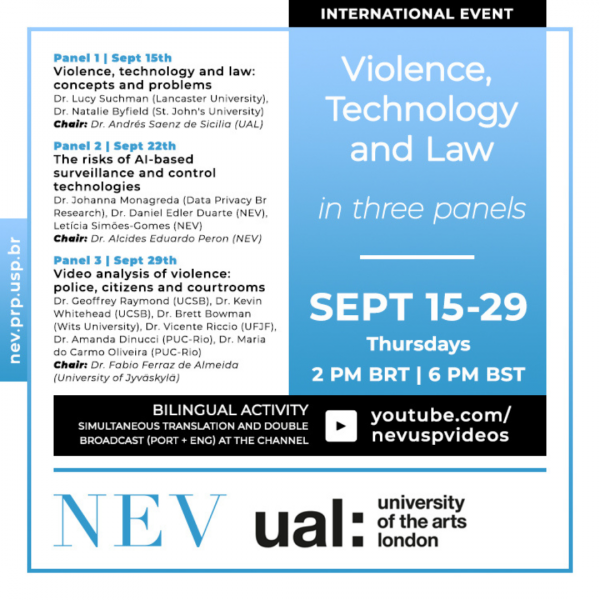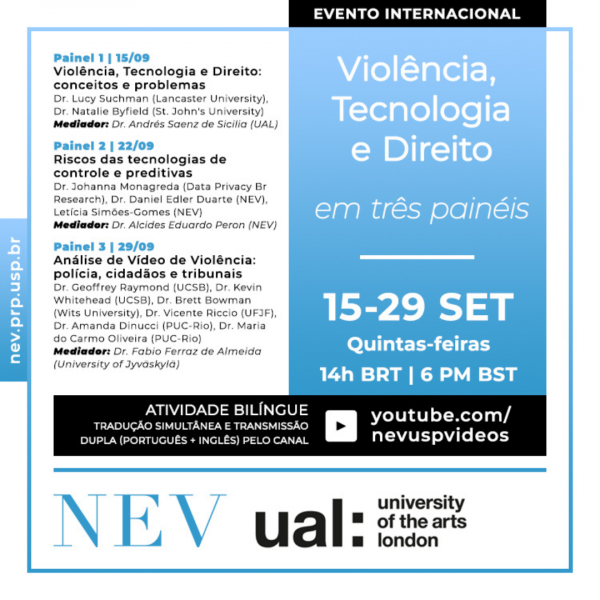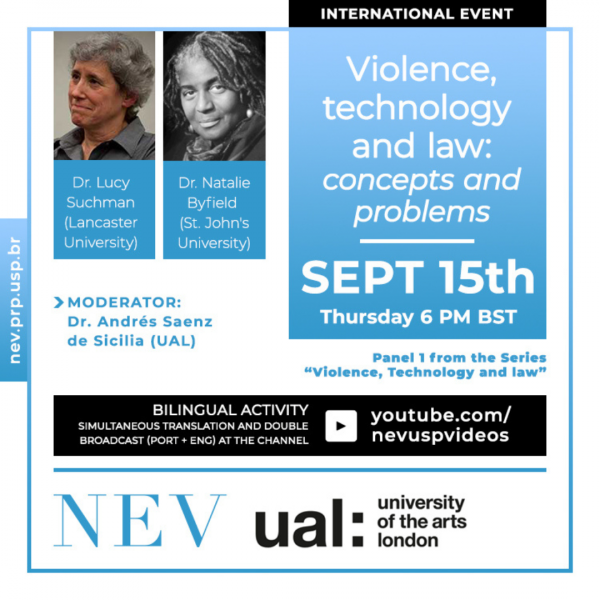Debate Series on Violence, Technology and Law
31 de August de 2022
In September, the NEV, in partnership with the University of the Arts London (UAL), will hold three bilingual debates (in Portuguese and English) titled “Violence, Technology and Law”. The events will be broadcast on the NEV YouTube channel on September 15, 22, and 29 at 2 pm (UTC -3). The opening panel will explore the theme “Violence, technology and law: concepts and problems”, featuring Lucy Suchman (Lancaster University) and Natalie Byfield (St. John’s University), with Andrés Saenz de Sicilia (University of the Arts London) serving as moderator.
Leia em Português | Read this in Portuguese
The second panel will address “The risks of artificial intelligence surveillance and control technologies”. The third and final panel will discuss the topic “Video Analysis of Violence”, addressing situations involving the police, citizens, and courtroom events. The event is an initiative of Alcides Eduardo Peron, from the NEV, under the coordination of Marcos César Alvarez, and Fabio Ferraz de Almeida.
Complete Schedule: Violence, technology and law (Violência, tecnologia e direito)

 Leia em Português | Read this in Portuguese
Leia em Português | Read this in Portuguese
What are the interchanges between technology and violence? Can a robust general conceptualisation of violence be established? How are contemporary technologies enabling and enacting violence? Do surveillance and monitoring systems in the Global North and South act as the driving force behind new forms of aggression? What are the limits of violence today? To what extent can legal frameworks contain and regulate these technologies?
These three events are dedicated to exploring these questions through a transdisciplinary examination of violence, technology, law and society. The increased use of security and surveillance technologies is reshaping how violence is enacted and regulated within urban space and therefore how individuals inhabit that space. A distinctive feature of this new paradigm is its simultaneous transnational development and application, rather than a linear or hierarchical flow of technologies and security practices from certain nations or regions to others. These developments have yet to be systematically interrogated and demand new theoretical and legal frameworks. In particular, existing concepts and approaches, such as the boomerang effect, laboratorization of third world cities and the prevalence of methodological nationalism appear inadequate to the problematics these new realities generate for researchers, policy makers and civil society groups aiming to address social violence. By bringing together researchers from law, sociology and philosophy we will address this deficit, sharing insights that will enable the development of an innovate transdisciplinary agenda for future research.
Panel 1: Violence, technology and law: concepts and problems
(Violência, tecnologia e direito: conceitos e problemas)

How can a theoretical framework for analysis be developed that would be adequate to the complex and interconnected character of violence, technology and law today? Which basic concepts and problems define this research program as it is practised by scholars and activists attempting to intervene in the present? This panel will explore these questions as well as examining how projects such as the campaign to ban lethal autonomous weapons conceptualise violence in the course of their work.
Como desenvolver um quadro teórico de análise adequado ao caráter complexo e interconectado da violência, da tecnologia e do direito hoje? Quais conceitos básicos e definem este programa de pesquisa como é praticado por estudiosos e ativistas de problemas que tentam intervir no presente? Este painel explorará essas questões, bem como examinará como projetos como a campanha para banir armas autônomas letais conceituam a violência no decorrer de seu trabalho.
Participants:
Lucy Suchman
Lucy Suchman’s research works at the intersections of anthropology and the field of feminist science and technology studies, focused on cultural imaginaries and material practices of technology design. Her current research extends my longstanding critical engagement with the fields of artificial intelligence and human-computer interaction to the domain of contemporary militarism. She is concerned with the question of whose bodies are incorporated into military systems, how and with what consequences for social justice and the possibility for a less violent world.
Natalie Byfield
Dr. Natalie Byfield is a professor in the Department of Sociology and Anthropology at St. John’s University in Queens. She has taught in the fields of sociology and communications. Her overall research focuses on the role of language in society and how the powerful and those with less influence use language to shape their world. Her research explores media in society, cultural studies, social theory, and the co-determined nature of race, gender, and class formations. She spent close to a decade working as a journalist in New York City. Her work has appeared in the New York Daily News, Time Magazine, The American Lawyer, New York Law Journal, and New York Woman. Dr. Byfield recently published her book Race, Media & the Central Park Jogger Story (Temple University Press, 2014).
Chair: Andrés Saenz de Sicilia is an Associate Lecturer at Central Saint Martins, University of the Arts London. His writing is broadly concerned with the relations between conceptual, social and aesthetic forms and has appeared in Radical Philosophy, Language Sciences, the European Journal of Social Theory as well as the Sage Handbooks of Marxism and Frankfurt School Critical Theory. He is currently working on a project exploring violence and capitalism.
Panel 2: The risks of AI-based surveillance and control technologies
(Riscos das tecnologias de vigilância e preditivas)
In the spectrum of new AI-based systems, surveillance and monitoring technologies have been deployed globally. Consequently, Predictive Policing, Facial Recognition, Risk Classification systems, among others, have become the target of numerous
criticisms, since they have an enormous potential to reproduce biases and discrimination. This panel explores how they have been used in Brazil, and investigates the risks and limits associated with them.
Participants:
Letícia Simões Gomes is a phd student at the Department of Sociology of the Faculty of Philosophy, Letters and Human Sciences at the University of São Paulo (FFLCH/USP) and researcher at the Center for the Study of Violence (NEV/USP). She holds a Master’s in Sociology from the same department and a BA in International Relations from the University of São Paulo. She worked in the area of Human Sciences, Political Science and Public Policy. Currently, her research is situated between the Sociology of Violence and the Sociology of Race Relations, with the theme of predictive policing technologies in contexts of racial inequality.
Johanna Monagreda: Doctor and Master in Political Science from the Federal University of Minas Gerais. She did a Licentiate in Political and Administrative Science at the Universidad Central de Venezuela. She is a researcher at the Nucleus of Studies and Research on Women NEPEM / UFMG, and author of the thesis: “El Estado no nos ha regalado nada: Processes of institutionalization of the demands of Afro-descendant movements in Brazil, Venezuela and Ecuador”. Throughout her professional career, she has participated in important research in the area of human rights, racial equality policies and women’s policies in Latin America.
Daniel Edler Duarte is a FAPESP postdoctoral researcher at the Department of Sociology at the University of São Paulo (USP). Previously, he was a CAPES/Pro-Defense researcher at the Escola de Guerra Naval (EGN). He completed a PhD in Politics and International Studies at the Department of War Studies, King’s College London (KCL). Daniel was also a professor and assistant researcher at the Center for International Relations at Fundação Getulio Vargas (CPDOC/FGV) and project coordinator at Fundação Konrad Adenauer (KAS-Brasil). His current research addresses the production and use of new security technologies, focusing on the implementation of biometric surveillance devices and the development of predictive policing systems.
Chair: Alcides Eduardo R. Peron is a NEV’s Associate Researcher.
Panel 3: Video Analysis of Violence: police, citizens and courtrooms
(Análise de Vídeo de Violência: polícia, cidadãos e tribunais)
The increasing availability of video-recording devices (e.g. body cams, mobile phones, etc.) has had dramatic implications on police work and on people’s understanding of violence across the world. By capturing potential episodes of violence in police-citizens encounters, these recordings have also impacted the work of legal professionals, which involves (re)interpreting video-material as evidence in the courtroom. For this panel, we present a series of studies which have addressed these issues in the context of Brazil and the US.
Participants:
Geoffrey Raymond is a Professor of Sociology at the University of California, Santa Barbara. His research interests include conversation analysis, the role of talk-in-interaction in the organisation of institutions, and qualitative research methods. He is a co-principal investigator (with Nikki Jones) in the project “Talking Justice: Identifying Interactional Mechanisms to Improve the Quality of Police-Civilian Encounters”..
Kevin Whitehead is an Associate Professor at the University of California, Santa Barbara. His main research interests have been at the intersection of social interaction and race/racism. He has been collaborating with multi-disciplinary and multi-methodological groups of colleagues located at a number of institutions in the United States, Canada, and South Africa on research focused on advancing research and theory on conflicts and violence in both everyday interactional settings and in police encounters.
Brett Bowman is a Professor in the Department of Psychology at the University of the Witwatersrand in South Africa. His research is on the intersections of violence and social asymmetries in low-middle income countries. His current research examines how risks for violence translate into its enactments.
Amanda Velasco has a PhD in Language Studies from the Pontifical Catholic University, Rio de Janeiro (PUC-Rio). Her research area is linguistics, particularly in talk-in-interaction and multimodal studies. She draws upon conversation analysis to study communication in police contexts.
Maria do Carmo Oliveira is a Professor at Pontifical Catholic University, Rio de Janeiro (PUC-Rio). Her research areas are Applied Linguistics and Discourse Analysis and her research interests are social interaction in institutional contexts; language and professional practices, including education, law, politics and media; communication in post-bureaucratic organisations; face, identity and (in)politeness in face-to-face and technology-mediated interactions; work in a global world.
Vicente Riccio is an Associate Professor at the Federal University of Juiz de Fora. His research field is Sociology, especially Sociology of Law. His research interests include public policy, justice, public safety, media and law. He has also worked as project consultant for the Ministry of Justice, Ministry of Education, Rio de Janeiro Department of Public Safety, among other institutions.
Chair: Fabio Ferraz de Almeida is a postdoctoral researcher in the Department of Language and Communication Studies at the University of Jyväskylä, Finland, currently working on the project “Negotiating International Criminal Law: A courtroom ethnography of trial performance at the International Criminal Court”’, funded by the Academy of Finland. In his research, he draws upon conversation analysis and ethnomethodology to study talk-in-interaction in institutional settings, particularly in police and judicial contexts. He has conducted research in legal institutions in Brazil and the United Kingdom.



